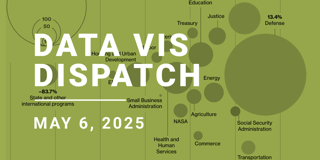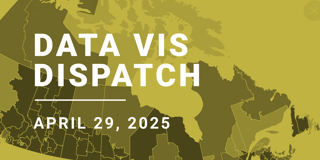Data Vis Dispatch, June 21
Welcome back to the 50th edition of Data Vis Dispatch! Every week, we’ll be publishing a collection of the best small and large data visualizations we find, especially from news organizations — to celebrate data journalism, data visualization, simple charts, elaborate maps, and their creators.
Recurring topics this week include extreme heat, occupied territory in Ukraine, and economic trends.
In the Dispatch, we often fold charts on the economy into other topic sections — in particular, those on war, politics, and the pandemic. But this week it was clear that economic charts deserved to come first. The labor market is hot:

Amid high inflation, interest rates are up and stock performance is down:


High gas prices are contributing to an overall increase in the cost of living:



And supply problems continue to cause shortages:


One cause of disruption is the war in Ukraine, where Russia is occupying about 20% of the country and blocking agricultural exports:



EU officials have called the blockade a war crime. And even as the fighting continues, so do efforts to document the use of banned weapons and tactics in Ukraine:



The upshot for Russia's ultrarich? Private jets to Dubai instead of Paris.

Speaking of Paris, a new French legislature was elected on Sunday:





In Spain, regional elections in Andalusia showed a strong swing to the right:







Other recurring political topics included the increasing role of election denialism in the Republican Party, and the past and future of U.S. abortion restrictions:






To set the tone for our climate section, here are two beautiful Washington Post maps of the western United States — one on drought, and one on flood:


A record heatwave swept Europe and North Africa:


These maps looked at histories of slavery and colonization in the United States:


And these two looked at the problem of rural broadband access in the U.S. and U.K.:


Other topics included land use, crime, gender equality, and sports — not to mention the wreck of a 17th century Spanish galleon:








What else we found interesting


Applications are open for...
- A digital infographic designer at the South China Morning Post
- A data vis writer and a data vis evangelist at Datawrapper!
Help us make this dispatch better! We'd love to hear which newsletters, blogs, or social media accounts we need to follow to learn about interesting projects, especially from less-covered parts of the world (Asia, South America, Africa). Write us at hello@datawrapper.de or leave a comment below.
Want the Dispatch in your inbox every Tuesday? Sign up for our Blog Update newsletter!



